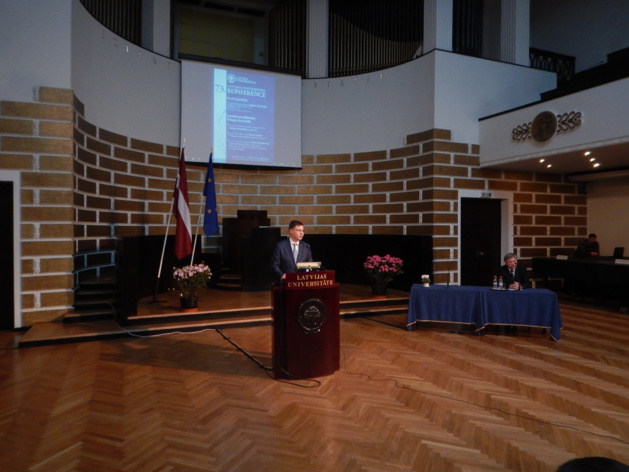
Valdis Dombrovskis lors de sa conférence à l'université de Lettonie le 2 février 2015. Crédit : Jean-Baptiste Roncari
The official website of the European Union defines the Council of the European Union in the following way: “The Council of the European Union, or the Council of the EU, is the body where the ministers of government of every Member State of the EU come together to adopt legislative acts and to coordinate policies.” Even if it is an institution in its own right, the Council often works in close collaboration with the European Commission. It is in fact due to that the Vice President of the Commission could present the issues of his institution and those of the Council during the conference, because the two work together. They share executive and legislative power. The European Commission and the Council of the European Union thus work hand in hand.
In this case, how is the presidency of the Council of the EU organised? In the present case, it is the Latvian ministers who are called upon. When the Council meeting focus on ecology, for example, it is the Latvia Minister of Ecology who presides over these reunions and the reflections of the Council. There is a Latvian president for every theme of work. In a more general manner, the presidency looks after organising the work of the Council, presiding over the meetings at all levels, and representing the Council in its dealings with the other institutions of the EU, and at global level.
This does not mean, however, that Latvia has full powers or can act however she deems fit. In effect, the presidencies of the Council of the EU function as a triumvirate in order to assure a certain political coherence for the future. The areas of work are therefore more or less the same for 18 months as every presidency lasts a semester. The current trio is made up of Italy, Latvia and Luxembourg. This also helps to reinforce the relations between the countries, and to discover the political diversity of the European salad bowl.
The primary objectives of the current triumvirate are the following: get back to a financial stability, return to growth in the EU, create new jobs, solidify the digital Single market, and to reinforce the role of the EU on the world scene. All these themes were discussed by the Vice President of the Commission during his speech, but among the numerous objectives, three key points of the programme are thought to help the upturn in growth.
Job Creation
Domborvskis underlined that there is “a large percentage of unemployed people in the European Union, particularly among young people.” We have an unemployment rate of 10%. The two extremes are Germany and Greece, who are at 4.9% and 24.9% respectively. One of the principal objectives for the Council and the Commission is therefore to create jobs whilst helping to fight against poverty and marginalisation. To accomplish this, the emphasis will be placed on mobility, social dialogue, the creation of quality jobs, and the improvement of jobs for young people. The objective is clearly to get out of this critical condition harmful to the European Union’s competitiveness on the international scene. The Council has not hesitated to classify the situation as ‘worrying’. The former Latvian Prime Minister did not deny this, clarifying that the “promotion of work is one of the main priorities.”
Achieving the digital single market
Another important objective of the Council and the Commission is to create a digital single market. The President of the Commission, Jean-Claude Juncker, believes that “in creating a connected digital single market, we can generate up to €250 billion euro in further growth.” But what is a single digital market? It is about getting rid of the repercussions national borders could have on our technological tools. The most talked about example is that of the mobile phone. The Commission and the Council believe that a citizen of the European Union should be able to use their mobile phone in another Member state at a low cost. But the creation of a digital single market also means common rules for the protection of data or even the end of geographic restrictions on the internet (geo-blocking). Such a market, according to Jean-Claude Juncker, will also enable the creation of “tens of thousands of new jobs.” This ambitious project makes up one of the pillars of the programme of the current triumvirate. It has to be completed by the end of 2015.
Removing the borders of the European Union
The stated objective of the European Union form the outset has been the creation of a single, commercial market, without borders, and is also one of the large projects of the Council. The latter has to “enable consumers and business to buy and sell goods and services throughout the EU as easily as in their national market, whatever their nationality and place of establishment.” The work will be above all to find agreements and common grounds between the Member States to respond to the “practical problems that the consumers and businesses experience daily in the single market”.
It is well understood that the abolition of the borders of the European Union, whether it be through the creation of a digital single market or a non-digital single market, represents one of the primary for the Council and Commission to create work and to revive growth. Latvia, which succeeds Italy and comes before Luxembourg, therefore is taking part in ambitious European projects across the historic presidency. The intermediate member, Latvia plays a decisive role in the coherency of the current trio. After having harboured the European Capital of Culture in 2014 (Riga) the Baltic country is seeing its European influence strengthen further still at the start of 2015.




























